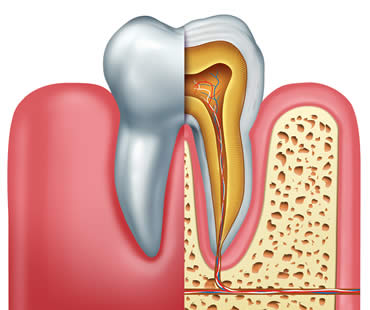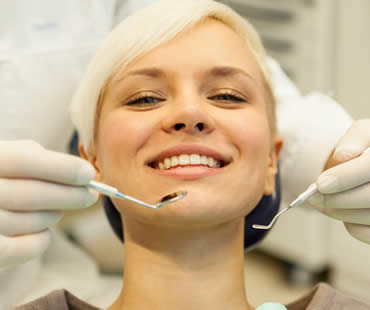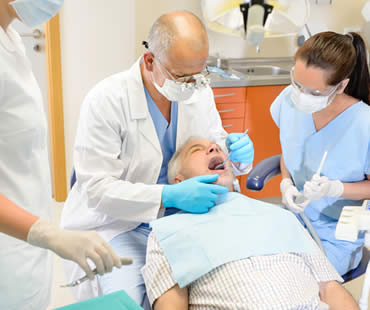
Cosmetic dentistry is becoming an increasingly popular option for improving not only the appearance of your smile but your overall self-confidence. If you are considering cosmetic dentistry as a means to better both your smile and your image, the following may answer some of your most common questions:
What can cosmetic dentistry fix? Cosmetic dental treatments and procedures can fix a multitude of issues including crooked, gapped, stained, discolored, broken, or missing teeth.
How do I locate a qualified cosmetic dentist? Search for a dentist who is accredited with the American Academy of Cosmetic Dentistry (AACD). Inquire about a potential dentist’s training and experience with the treatments you are seeking, as well as referrals and photos from previous patients who have undergone the same procedures.
What are some common cosmetic dental procedures and treatments? Porcelain veneers, composite bonding, dental implants, teeth whitening, and tissue sculpting are all examples of cosmetic options available to improve your smile.
How long will the process take to achieve a better smile? The length of time varies dependent on the type of procedure or treatment and also on your individual needs. However, many cosmetic procedures can be completed in as little as one or two dental visits.
How can I preview what my new smile will look like? Modern technology allows your cosmetic dentist to use computer-aided imaging and models to show the potential of your new smile.
How long can I expect my improved smile to last? With proper oral care and consistent visits to your dentist, most cosmetic dental treatments and procedures can last for many years and even decades.
With the help of cosmetic dentistry, an improved smile will boost your self-confidence, as well as better your overall oral function and health. Consult with an accredited cosmetic dentist to develop a treatment plan that addresses your specific cosmetic concerns and get ready to greet the world with a bright, new smile!
We look forward to seeing you in our Sicklerville dental office

Pregnancy is an exciting time in your life that brings about many changes to your body. Your oral health is affected as well. There are specific things to keep in mind during pregnancy related to your teeth, gums, and caring for them. Let’s talk about the things you should be thinking about for your mouth while expecting a baby.
Medications:
Tell your dentist about any prescription or over-the-counter medicines you’re taking, so that it’ll be easier to prescribe any drugs needed for you during dental treatment. Your dentist may also want to consult your doctor to discuss safe painkiller or antibiotic options for you during pregnancy.
X-Rays:
If you have a dental emergency or a problem that needs diagnosis, an X-ray may be required. Radiation exposure from dental X-rays is very low, but your dentist will cover you with a leaded apron to protect your abdomen. A leaded thyroid collar will also be used to protect your thyroid from radiation.
Gingivitis:
It’s not uncommon for some women to develop pregnancy gingivitis, which is a gum problem that occurs during the hormonal fluctuations of pregnancy. This condition is an inflammation of the gums that causes tenderness, swelling, and usually some bleeding during dental hygiene tasks. Your dentist may suggest more frequent cleanings during pregnancy to prevent gingivitis, because left untreated it can advance to more serious gum disease.
Pregnancy tumors:
Some pregnant women experience overgrowths of tissue called pregnancy tumors, which appear on the gums mostly during the second trimester. They are not cancerous and are usually located between your teeth. Dentists believe they are related to having too much plaque. Pregnancy tumors bleed easily and appear red and raw. Usually they go away after the baby’s birth, but some women prefer to have them removed before then. Discuss options with your dentist to see what’s best for you.
If you need a dentist in Sicklerville contact us today

A toothache can make your life miserable. It may involve terrible tooth pain as well as headaches, sleeplessness, and difficulty eating. A trip to the dentist’s office is a must if you want relief. An examination might reveal that you need root canal treatment to save your tooth and eliminate your symptoms.
Severe tooth decay, a faulty crown, repeated tooth procedures or trauma are common causes of tooth damage. These issues can also lead to infection of your tooth’s pulp, which is on the inside of your tooth. Also called endodontic therapy, root canal treatment focuses on getting rid of the damaged tooth pulp. If infection is present, it is also removed. The root canal is thoroughly cleaned and disinfected, and then the area is filled with a special material called gutta-percha. Finally, the tooth is typically restored with a dental crown to provide maximum protection from future damage.
Some of the benefits you can expect from root canal treatment include chewing with normal biting force and sensation, maintaining natural tooth appearance, protecting other teeth from excessive wear, and avoiding a troublesome gap in the smile. In as little as one or two appointments, these benefits can be achieved without a great deal of discomfort. Innovations in technology have made the experience of root canal treatment usually no more painful or difficult than simply getting a dental filling. Once root canal treatment is complete, the tooth can last a lifetime with regular checkups and proper oral hygiene.
Our dental office is located in Sicklerville

You might think that the point of going to your general dentist is for cleanings and maybe an occasional filling. But you are wrong if you believe that’s all your dentist can offer you! A wide variety of treatments is available at a typical general dentist’s office.
Most visits to your general dentist include an initial consultation, thorough examination, and diagnostic tests if needed like dental x-rays. You’ll have the opportunity to express any problems or concerns you have, and your dentist will identify any issues that you might not be aware you have. You can also expect a meticulous professional cleaning to eliminate tartar buildup and stains that you may not have been able to get rid of at home.
You can expect these common procedures at many general dentistry practices:
- Fillings – to repair damage caused by tooth decay, often using composite resin material to provide a strong yet cosmetically appealing solution.
- Bonding – using composite resin to repair issues like cracks, chips, gaps or stains.
- Crowns – also called caps, these restorations are fitted over damaged or broken teeth to restore tooth structure and function, and to protect them from future damage.
- Bridges – to replace missing teeth, a bridge structure anchors an artificial tooth or teeth. Crowns fit over natural teeth on both sides of a gap, in which the artificial tooth replaces a missing tooth to provide a natural appearance and functional replacement.
- Dentures – if a number of teeth are missing, dentures are removable false teeth with the goal of functioning and looking like real teeth.
- Root canal treatment – when the interior pulp of a tooth is badly damaged or infected, this procedure removes the faulty portion and completely restores the tooth to avoid tooth loss.
- Teeth whitening – when teeth have become discolored with age, tobacco use, diet, or more, it can be very difficult to restore their white shade without the aid of professional whitening. General dentists may offer at-home kits or in-office whitening treatments.
- Maxillofacial treatments – mouth, jaw, or facial procedures are sometimes offered, including options like TMJ treatment or dental implants.
If you need a dentist in Sicklerville contact us today

While minor gum recession can be treated by your dentist with deep cleaning and antibiotics, serious gum recession can only be treated with oral surgery. A loss of bone and gum pockets that are very deep require gum surgery to address the pain and damage left by acute gum recession.
Three treatments are used primarily in the treatment of serious gum recession, in order of invasiveness: pocket depth reduction, regeneration, and soft tissue graft. Pocket depth reduction involves a deep cleaning of the affected area. The periodontist folds the gum tissue back and utilizes tooth scaling and root planing to remove any tartar and plaque built up around the tooth. Once the gum pockets are clean, the surgeon pulls the gum tissue gently around the tooth, eliminating the deep pockets altogether or significantly reducing their depth.
Regeneration utilizes a similar treatment to pocket depth reduction, but it also addresses any bone loss that occurred due to acute gum recession. In this process, a regenerative agent such as graft tissue, membranes or tissue stimulating proteins is added to the affected area. The gum tissue is then tucked into place and stitched down. Over time, the regenerative agent will work to rebuild lost bone and tissue, leaving healthy and thriving tissue behind.
The most common soft tissue graft is taken from the patient’s own mouth, either by removing tissue from the roof of the mouth or from the gum tissue near the affected tooth. The healthy gum tissue is placed in the affected area, over the exposed tooth root, protecting it from infection and damage.
To prevent the need for oral surgery to address your receding gums, have good oral hygiene habits. Brush, floss and see your dentist twice a year for checkups and professional cleanings. Talk to your dentist if you have any other questions about how to reverse or prevent gum recession.
If you live in the Sicklerville area contact us today

Wisdom teeth are the third set of molars and the last adult teeth to erupt into the mouth. Most people have four wisdom teeth, two on the bottom and two on top. Many people do not have enough room for these molars to emerge completely, causing them to become impacted in the gum. Impacted wisdom teeth are difficult to clean, making them more susceptible to decay and disease. Other dental problems caused by impacted wisdom teeth include pain, damage to surrounding teeth, and bite alignment issues. For these reasons, your dentist may recommend having the impacted teeth removed to prevent future problems.
Surgery to extract an impacted wisdom tooth or set of wisdom teeth is usually an outpatient procedure done in your dentist or oral surgeon’s office. If the tooth or surrounding area are deemed to have an infection prior to the procedure, surgery will be delayed, and your dental professional will likely prescribe antibiotics to help heal the area.
On the day of surgery, local anesthesia will be administered to numb the area where the extracted tooth will be removed. Depending on the severity of your case, your dentist or oral surgeon may also utilize a general anesthetic.
Once the anesthesia has taken effect, an incision will be made to open up the gum and any bone blocking the tooth will be removed. Your dentist or surgeon will then separate the tissue connecting the bone to the tooth and extract the tooth. Some teeth are too large to remove in one piece, in which case your surgeon will cut the tooth into smaller pieces to make it easier to remove. Finally, the incision is closed with stitches and packed with gauze to help alleviate bleeding.
Long-term complications from impacted wisdom tooth surgery are rare. To ensure a successful recovery from this or any oral surgery, be sure to follow all aftercare instructions provided by your dentist or oral surgeon.
Our dental office is located in Sicklerville












